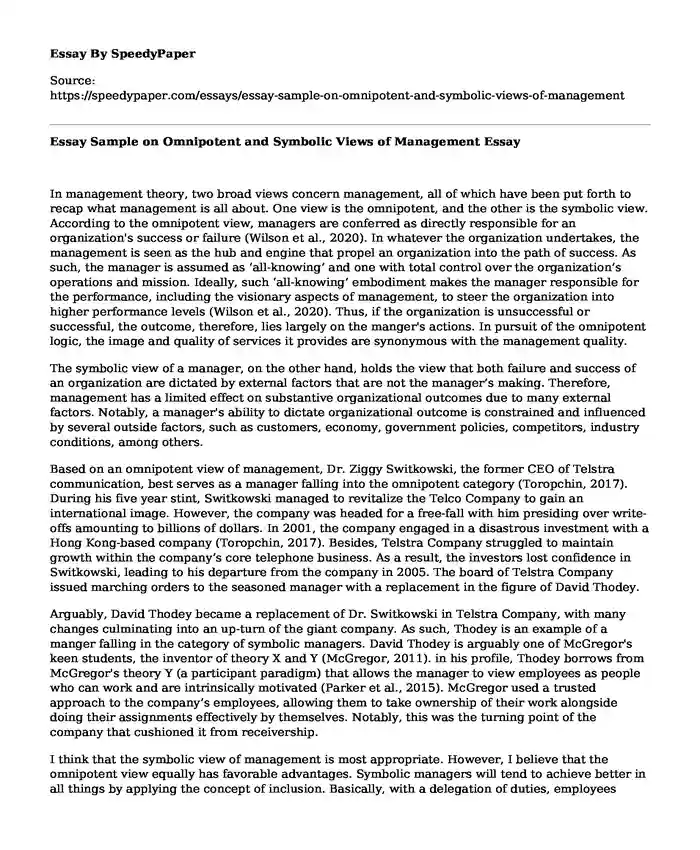
| Type of paper: | Essay |
| Categories: | Business management |
| Pages: | 3 |
| Wordcount: | 684 words |
In management theory, two broad views concern management, all of which have been put forth to recap what management is all about. One view is the omnipotent, and the other is the symbolic view. According to the omnipotent view, managers are conferred as directly responsible for an organization's success or failure (Wilson et al., 2020). In whatever the organization undertakes, the management is seen as the hub and engine that propel an organization into the path of success. As such, the manager is assumed as ‘all-knowing’ and one with total control over the organization’s operations and mission. Ideally, such ‘all-knowing’ embodiment makes the manager responsible for the performance, including the visionary aspects of management, to steer the organization into higher performance levels (Wilson et al., 2020). Thus, if the organization is unsuccessful or successful, the outcome, therefore, lies largely on the manger's actions. In pursuit of the omnipotent logic, the image and quality of services it provides are synonymous with the management quality.
The symbolic view of a manager, on the other hand, holds the view that both failure and success of an organization are dictated by external factors that are not the manager’s making. Therefore, management has a limited effect on substantive organizational outcomes due to many external factors. Notably, a manager's ability to dictate organizational outcome is constrained and influenced by several outside factors, such as customers, economy, government policies, competitors, industry conditions, among others.
Based on an omnipotent view of management, Dr. Ziggy Switkowski, the former CEO of Telstra communication, best serves as a manager falling into the omnipotent category (Toropchin, 2017). During his five year stint, Switkowski managed to revitalize the Telco Company to gain an international image. However, the company was headed for a free-fall with him presiding over write-offs amounting to billions of dollars. In 2001, the company engaged in a disastrous investment with a Hong Kong-based company (Toropchin, 2017). Besides, Telstra Company struggled to maintain growth within the company’s core telephone business. As a result, the investors lost confidence in Switkowski, leading to his departure from the company in 2005. The board of Telstra Company issued marching orders to the seasoned manager with a replacement in the figure of David Thodey.
Arguably, David Thodey became a replacement of Dr. Switkowski in Telstra Company, with many changes culminating into an up-turn of the giant company. As such, Thodey is an example of a manger falling in the category of symbolic managers. David Thodey is arguably one of McGregor's keen students, the inventor of theory X and Y (McGregor, 2011). in his profile, Thodey borrows from McGregor's theory Y (a participant paradigm) that allows the manager to view employees as people who can work and are intrinsically motivated (Parker et al., 2015). McGregor used a trusted approach to the company’s employees, allowing them to take ownership of their work alongside doing their assignments effectively by themselves. Notably, this was the turning point of the company that cushioned it from receivership.
I think that the symbolic view of management is most appropriate. However, I believe that the omnipotent view equally has favorable advantages. Symbolic managers will tend to achieve better in all things by applying the concept of inclusion. Basically, with a delegation of duties, employees become responsible for their actions leading to growth and motivation as compared to know-it-all and do-it-all management styles. Even though I do everything right as the manager, the junior person reflects on my ability; thus, I don’t think this view is effective and valid.
References
McGregor, D. (2011). Theory X and theory Y. Organization theory, 358, 374. https://www.mindtools.com/pages/article/newLDR_74.htm
Parker, M., Plenderleith, T., Lockwood, A., & Thodey, D. Former Telstra Executive to chair CSIRO board (2015). https://www.intheblack.com/articles/2015/04/01/the-rise-of-david-thodey-outgoing-telstra-ceo
Toropchin, G. V. (2017). The Personality of Ziggy Switkowski And Nuclear Debate In Australia In The 1990S-2000S. https://www.abc.net.au/worldtoday/content/2004/s1255598.htm
Wilson, J. F., Wong, N. D., & Toms, S. (Eds.). (2020). Management and Industry: Case studies in UK industrial history. Routledge. https://thebusinessprofessor.com/lesson/omnipotent-and-symbolic-views-of-managers/
Cite this page
Essay Sample on Omnipotent and Symbolic Views of Management. (2023, Oct 15). Retrieved from https://speedypaper.net/essays/essay-sample-on-omnipotent-and-symbolic-views-of-management
Request Removal
If you are the original author of this essay and no longer wish to have it published on the SpeedyPaper website, please click below to request its removal:
- Essay Sample on the Reasons for the High Cost of Driving a New Car in the United States
- Free Essay Example: Required Resolution
- Free Essay. History and Future of Sports Car Doors Evolution
- Essay Sample on Home Depot Company Overview
- Paper Example - Airline Pricing Strategy
- Essay Sample on Dimension of Entrepreneurship
- Essay Sample on Phoenix Health and Well-Being Strategic Business Plan
Popular categories




